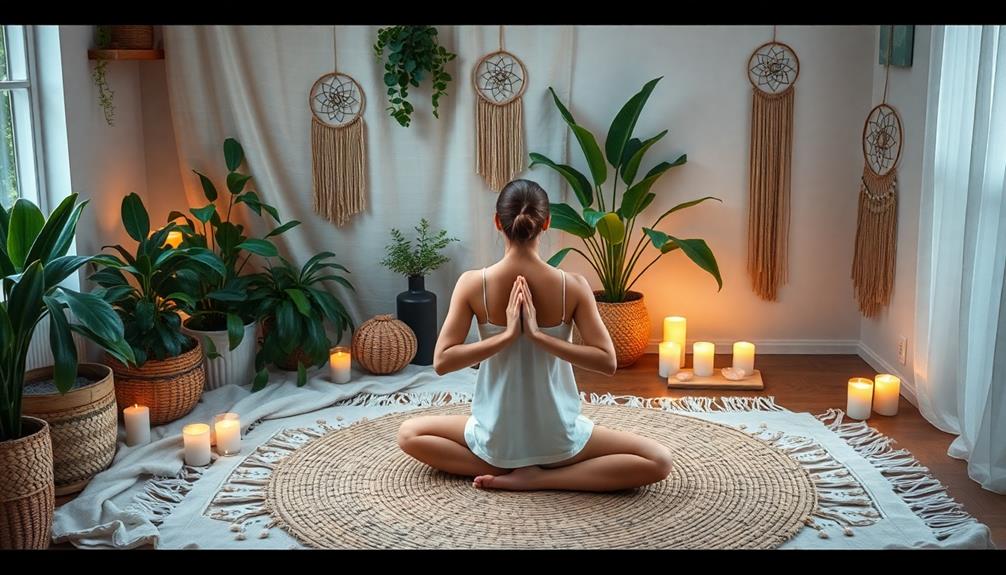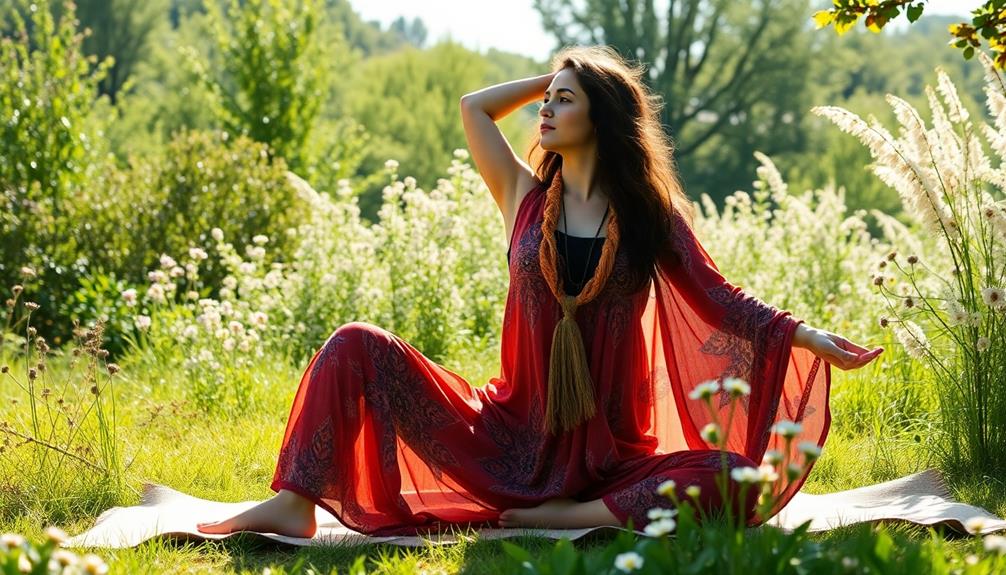The Boho approach to dealing with stress and anxiety emphasizes creativity, connection, and holistic well-being. You can embrace self-expression through art, music, or journaling, which helps release pent-up emotions. Connecting with nature boosts your mood and reduces cortisol levels, so try yoga or hiking outdoors. Regular mindfulness practices, like breath control techniques, enhance your focus and calm your mind. Building a supportive community also fosters resilience and reduces feelings of isolation. Incorporating these elements into your daily life can greatly improve your emotional health. There are even more insightful practices to explore that could further enhance your journey to peace.
Key Takeaways
- Embrace creativity through artistic pursuits like painting or journaling to release emotions and lower stress levels effectively.
- Practice yoga and mindfulness techniques, such as breath control and flowing poses, to enhance emotional awareness and promote relaxation.
- Spend time outdoors to connect with nature, which reduces cortisol levels and fosters a sense of calm and security.
- Build a strong support system through community connections, fostering belonging and reducing feelings of isolation.
- Engage in regular physical activity to release endorphins, improving mood and resilience against stress.
Embracing the Boho Lifestyle
Embracing the Boho lifestyle brings a revitalizing sense of freedom and creativity that can considerably lighten the burdens of stress and anxiety.
You'll find that this free-spirited approach encourages self-expression and nurtures a deep connection to nature. Over a period of time, these elements collectively foster a sense of calm that helps you feel good in your own skin.
To fully immerse yourself in the Boho way, make sure you prioritize holistic health. Incorporate natural remedies and organic foods into your daily routine to nourish both body and mind.
Engage in artistic pursuits and listen to music that resonates with you; they're essential for emotional release and self-discovery.
Additionally, building community connections is important. Surrounding yourself with like-minded individuals can provide invaluable support and a sense of belonging, which alleviates feelings of anxiety.
You'll discover that the Boho lifestyle isn't just about aesthetics; it's a holistic approach that nurtures your well-being. By embracing this lifestyle, you'll cultivate a sense of freedom that empowers you to navigate life's challenges with grace and positivity.
The Role of Yoga
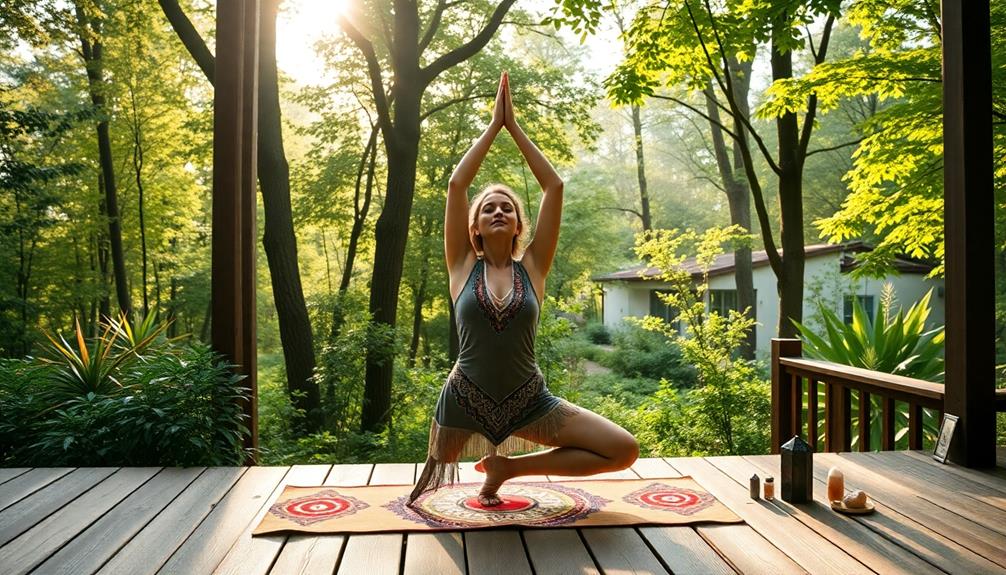
Yoga offers you a powerful way to embrace mindfulness through movement, helping you connect with your body and mind.
By practicing breath control techniques, you can enhance your emotional awareness and cultivate a deeper sense of calm.
Incorporating essential oils during your yoga practice can further amplify this calming effect, as certain scents are known to promote relaxation and reduce anxiety symptoms aromatherapy benefits.
As you flow through poses, you'll find yourself shifting from stress to serenity, creating a balanced state of being.
Mindfulness Through Movement
When stress and anxiety start to take over, turning to mindfulness through movement can be a game-changer. Yoga, with its blend of dynamic movements and focused breath, helps you engage physically while calming your mind. Incorporating foods rich in omega-3 fatty acids, like salmon, can also support cognitive function and enhance your emotional resilience clearing brain fog. Just a little bit of practice can lead to significant changes in your emotional well-being.
Start with key poses like Downward Facing Dog and Child's Pose to release tension in your body. As you flow through these movements, you'll see how far you can go in enhancing your overall balance. Incorporating a gentle flow followed by pranayama exercises allows you to shift from distractions to a heart-centered awareness.
Let's go ahead and establish a warm-up routine that emphasizes deep breathing and connecting with your heart. This prepares your body for deeper stretches and promotes a sense of peace.
By focusing on these movements, you foster mindfulness that reinforces the connection between your body and mind. Engaging in yoga can truly cultivate a space for emotional stability, allowing you to manage stress more effectively.
Breath Control Techniques
Breath control techniques are powerful tools that can elevate your mindfulness practice and help manage stress and anxiety. In yoga, practices like alternate nostril breathing promote a sense of balance and calmness, allowing you to shift your focus from distractions to a centered state of awareness.
When you combine pranayama exercises with dynamic movements, you deepen the connection between your breath and heart rate, fostering inner peace and grounding. Additionally, incorporating efficient energy use principles from renewable energy practices can enhance your overall sense of well-being by reducing stress related to energy costs and environmental concerns.
Using techniques like breath counting and deep diaphragmatic breathing can greatly alleviate the physical symptoms of anxiety. These methods activate your body's relaxation response, making it easier to let go of tension and find calm amidst chaos.
Incorporating breath work into your yoga routines not only aids in emotional regulation but also enhances your overall mental health by nurturing a mindful presence.
As you explore these breath control techniques, remember that consistency is key. The more you practice, the more you'll notice the positive impact on your stress levels and emotional well-being.
Enhanced Emotional Awareness
Through the practice of yoga, you can cultivate enhanced emotional awareness, allowing you to connect more deeply with your feelings and reactions. Yoga encourages you to link your breath with physical sensations, promoting mindfulness and presence in the moment. Techniques such as alternate nostril breathing help regulate your nervous system, leading to improved emotional balance and reduced anxiety levels.
Additionally, engaging in regular physical activity, as suggested in strategies for lifestyle for longevity, can further enhance your ability to manage stress effectively.
Engaging in poses like Child's Pose and Downward Facing Dog helps release physical tension often tied to emotional stress, enhancing your emotional clarity. As you flow gently through your practice, you create a safe space for self-reflection, enabling you to explore and understand your emotions more thoroughly.
This introspection fosters a deeper connection to your inner self, allowing you to recognize patterns in your emotional responses.
Consistent yoga practice has been shown to positively influence mental health by reducing symptoms of anxiety and depression. As you make yoga a regular part of your routine, you'll likely notice an overall enhancement in your emotional well-being.
Embracing these practices can empower you to navigate life's challenges with greater ease and resilience.
Mindfulness Practices
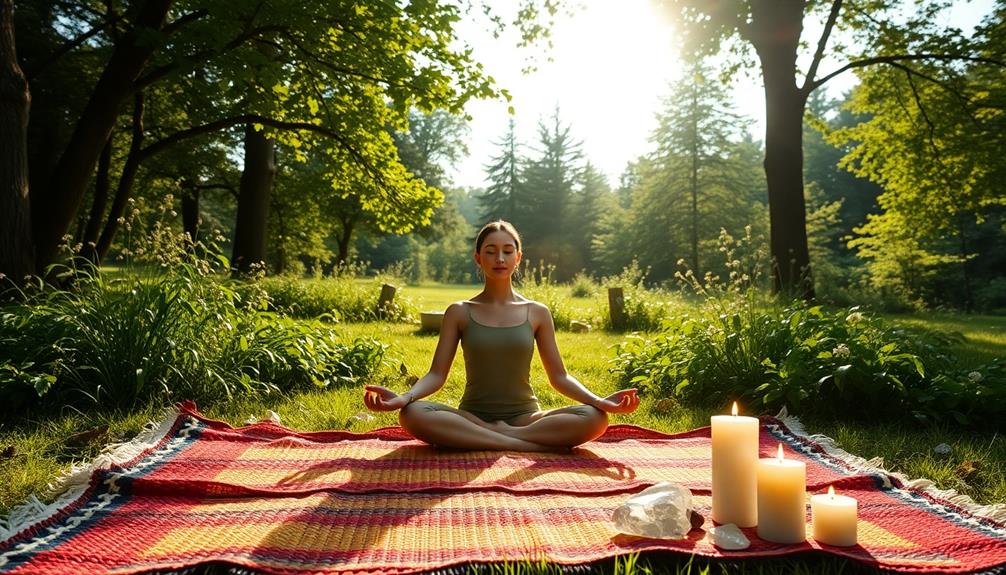
Amid the chaos of daily life, mindfulness practices like yoga and meditation offer powerful tools to manage stress and anxiety. By promoting relaxation and increasing your awareness of the present moment, these practices can transform your mental well-being.
Engaging in regular mindfulness exercises, such as alternate nostril breathing and gentle flow yoga, can greatly reduce anxiety symptoms and enhance your overall emotional health.
Research shows that mindfulness-based interventions lead to measurable improvements in emotional regulation and stress reduction. When you incorporate mindful breathing techniques into your daily routine, you anchor yourself in the present. This focus helps reduce the impact of stressors, allowing for a more balanced response to anxiety.
Moreover, practicing mindfulness fosters a deeper connection with yourself. As you cultivate compassion and understanding towards your thoughts and feelings, you can facilitate a healthier mental state.
Whether you dedicate just a few minutes in the morning or a longer session in the evening, these practices can lead to increased feelings of calm and peace.
Creative Expression Techniques
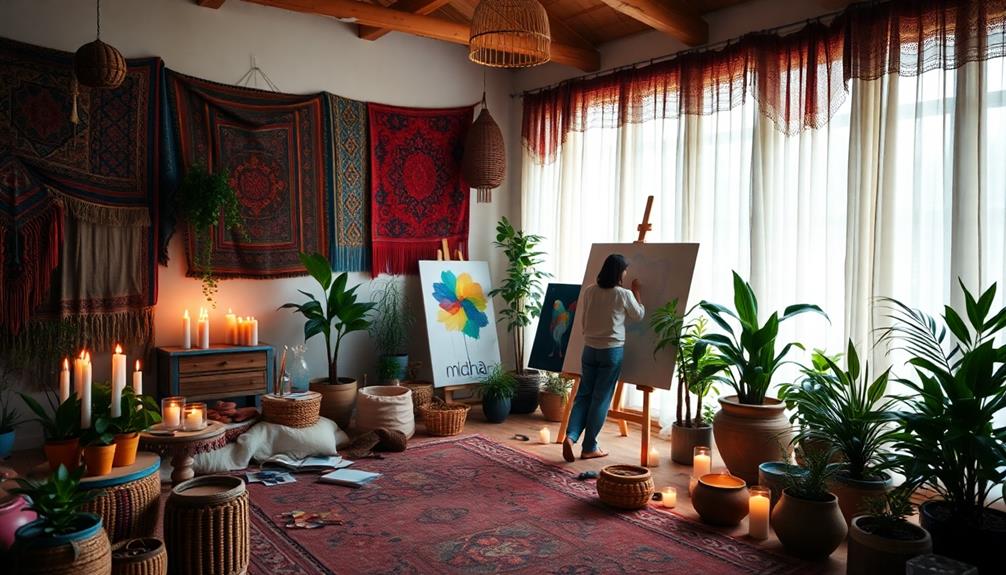
Harnessing the power of creative expression techniques—like journaling, painting, or playing music—can be a game changer for managing stress and anxiety. These activities provide a crucial outlet for your emotions and thoughts, allowing you to release pent-up feelings. Engaging in creative hobbies for just 20 minutes a day can lower cortisol levels, leading to better mental health and a brighter mood.
When you focus on the process rather than the outcome, you activate your brain's reward system, releasing dopamine that promotes feelings of well-being. Plus, engaging in group creative activities, like art classes or drum circles, fosters social connections that can combat feelings of isolation.
| Technique | Benefits | Emotional Impact |
|---|---|---|
| Journaling | Clarifies thoughts | Sense of relief |
| Painting | Enhances creativity | Joy and fulfillment |
| Playing Music | Boosts mood | Connection and nostalgia |
Nature Connection

Creative expression techniques can be incredibly effective for managing stress, but connecting with nature offers its own unique benefits. Spending time outdoors can markedly reduce cortisol levels in your body, leading to improved mental health and well-being.
Engaging with the natural environment can also provide a sense of safety and security, which is essential for vulnerable populations, such as seniors experiencing financial scams. When you engage in activities like hiking or practicing yoga in a natural setting, you'll likely notice an enhanced mood and a deep sense of relaxation.
Nature exposure encourages mindfulness, allowing you to focus on the present moment and diminish feelings of anxiety. Even a brief walk in the park can work wonders, boosting your cognitive function and emotional resilience.
The sights and sounds of nature create a calming atmosphere, making it a powerful tool for managing stress effectively.
Building a Support System
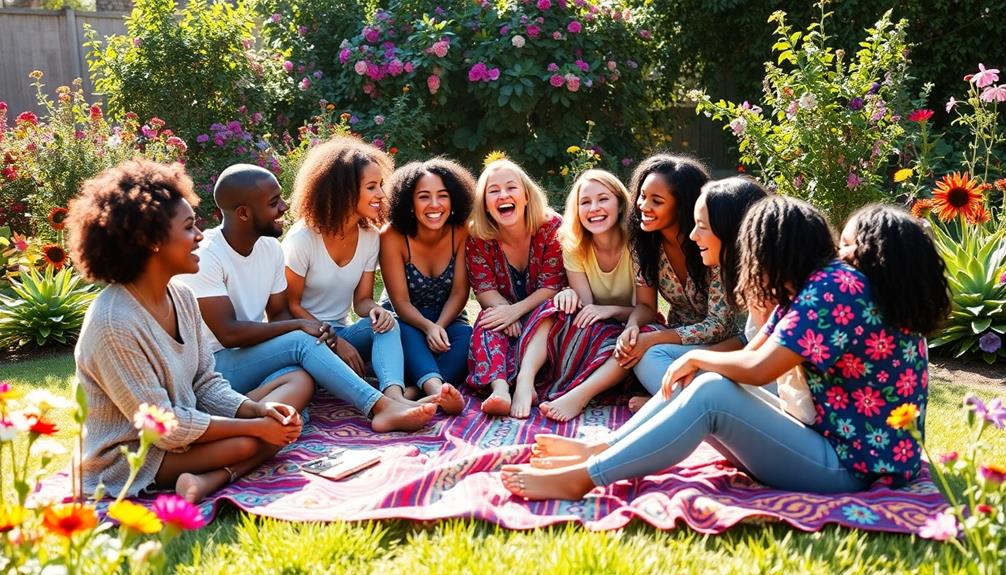
Building a support system is essential for managing stress and anxiety, so don't hesitate to reach out to friends, family, and your community.
Engaging in mindfulness activities and seeking professional counseling can strengthen these connections, making it easier to share your experiences.
Importance of Community Support
A strong support system is essential for managing stress and anxiety effectively. When you build connections with others, you foster a sense of belonging that reduces feelings of isolation. This is vital, as isolation can heighten stress and anxiety levels.
Community support offers diverse perspectives and coping strategies, enhancing your resilience during challenging times. Engaging in group activities, like yoga classes or support groups, can greatly promote your emotional well-being.
These environments encourage meaningful connections, allowing you to share experiences and feelings with others who understand. Research shows that individuals with strong social support networks often experience improved mental health outcomes and lower anxiety levels.
Professional Counseling Resources
Managing stress and anxiety often requires professional counseling resources, which can serve as an essential part of your support system. When you face mental health challenges, having a licensed therapist can provide a structured environment to address these issues.
Online platforms like BetterHelp make it easier than ever to connect with professionals, often within 48 hours. This quick access means you won't have to wait long for the support you need.
With BetterHelp, you can choose how you communicate with your counselor—whether it's through messaging, video, or phone sessions. This flexibility allows you to fit counseling into your schedule, making it less intimidating.
Plus, the platform is typically more cost-effective than traditional in-person therapy, making mental health resources accessible to a broader audience.
If financial constraints are a concern, BetterHelp also offers financial aid options, ensuring that anyone in need can build a supportive mental health system.
Mindfulness and Connection Activities
Sometimes, it's the connections we foster that can make all the difference in maneuvering stress and anxiety. Building a strong support system greatly enhances your mental health, providing emotional support and reducing feelings of isolation during tough times.
Engaging in mindfulness activities, like meditation or yoga, helps you connect with your inner self and cultivate peace, essential for managing anxiety.
Consider participating in group activities or classes, such as yoga or mindfulness workshops. These experiences foster a sense of community, making you feel less alone and more supported.
Regular communication with friends and family about your feelings strengthens these relationships, creating a reliable network for support when challenges arise.
Don't overlook the value of online platforms like BetterHelp, where you can connect with licensed therapists. These professionals provide tailored guidance that can enhance your support system and address your unique needs.
By integrating mindfulness and connection activities into your routine, you not only build resilience but also develop deeper relationships that can help buffer against stress and anxiety.
Embrace these practices, and you'll find yourself better equipped to navigate life's ups and downs.
Practical Tips for Everyday Life

Finding effective ways to cope with stress and anxiety in daily life can transform your overall well-being. Start by incorporating daily yoga practices, like gentle flow and pranayama exercises, to cultivate peace and balance in both body and mind. These practices can help alleviate stress and anxiety over time.
When you feel overwhelmed, try mindfulness techniques such as alternate nostril breathing. This simple exercise enhances breath control and promotes a sense of calm.
Regular physical activity is also essential; studies show that exercise greatly reduces symptoms of stress and anxiety by releasing endorphins and improving your mood.
Establish a consistent routine that includes relaxation practices, such as meditation or journaling. These activities create a safe space for processing emotions and thoughts, allowing you to unwind.
Frequently Asked Questions
What Are the Best Ways to Deal With Stress and Anxiety?
To deal with stress and anxiety, you can practice mindfulness, engage in regular physical activity, prioritize self-care, establish a support system, and explore professional help. These strategies can enhance your resilience and overall well-being.
Conclusion
So, while you might think embracing a boho lifestyle means wandering aimlessly through flower fields, it's actually about finding your center amid chaos. By weaving yoga, mindfulness, creativity, and nature into your daily routine, you're not just avoiding stress—you're kicking it to the curb with flair. And as you build your support system, remember: true freedom comes from connection, not isolation. So go ahead, dance barefoot in the grass; it's the perfect antidote to life's little storms.

